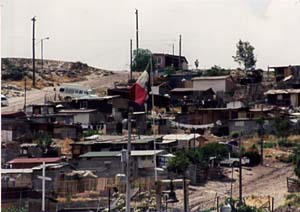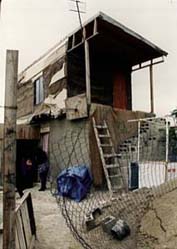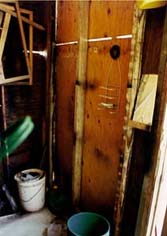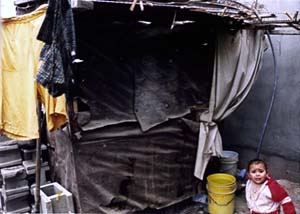 |
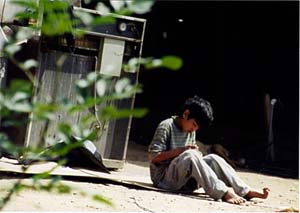 |
|
|
On the far hill another breeze has lifted up the dust, I wipe the last wind off of my face, but it doesn't feel clean. Knock, knock, "buenas tARDES," silence. The neighbor's child finds this interesting and comes over to see, then another, then another. Many children now, they might outnumber the dogs on this street. "vete" says the sweetly dressed four year at my side as she kicks a dog in the ribs. I smell smoke, someone nearby is burning garbage. Even when I go home I cannot leave my day behind me, the dirt, sewage and garbage clings to my skin. But unlike them, I have a shower. |
||
I spent a few hours in the Casa del Migrante, talked with a few of the migrantes and the director. They do good work there. The director said Mexico was a third world country, and at first I protested because statistically speaking it's not. But then I think he convinced me that I should think of it as if it were. If Mexico is considered to have more money, it is because there are more millionaires today due to general progress and NAFTA, but in the 80s the middle class disappeared, today there are only ricos, pobres, y miserables (the rich, the poor, and the destitute). The political oppression is awful, there is no hope for the average Mexican to raise his economic standing, the authorities are abusive and corrupt, power is the word. Los malos have all of the power, the pueblo has none.
Mexico is divided into two parts, north and south, in the south there are many miserable, many try to escape to look for something better. In Tijuana the poverty is immense. Many people live without potable water, without electricity, with pit toilets in the back yard, in a one or two room shack, not a lot of food, not a lot of clothing, not a lot of money for extras. Heidi and her family have been here for ten years, and they still bathe in buckets, but she says life is good. I've asked everyone I've met since I arrived what they think of TJ, if they like it, if they are glad they came, how they feel about the standard of living, and the answer is unanimously that they are very pleased to be here. Conditions are so good here in comparison to many of the places these people came from that life is easier and richer here in many ways, no one even entertains the idea of going back, other than to visit those relatives who stayed behind. Tijuana is poor and mugre (dirty) but it is not miserable. In the south many have no options, imagine walking two hours just to bring a bucket of water to your house, or working hard to earn five pesos every three days (55 cents). There, there is no money, no work, no food, no clinic, no hope.
Tony said that when she was working as a social worker in Hidalgo she visited a ghost town, there were some old people there, some children, and some pregnant chamacas, the men had all gone north for the year. Ten people she visited that lived and ate together came and sat around the dinner table, a small plate of beans and four or five stale tortillas for them to share. When they left town they had to walk hours to get to the bus route, an hour after they set out an old woman caught up with them on the trail who had come rushing from town. She brought with her an orange and a hard tortilla as a gift for Tony, to express her appreciation for having been visited by the 'asesora'. This woman who had nothing, gave everything. But even here in Tijuana we are in another world, I could see myself living in some of these places without too many problems. The ejido Lazero Cardenas, for example, is beautiful. We have gone several times for meetings with the families, and I ate in the home of the Señora Hermila on the hill overlooking the area. Everyone has pretty flowers and gardens, some people have subsistence gardens in their back yard, they wash with wash boards, they bathe in buckets, there is a makeshift four walled construct in the backyards of most homes serving as the bathroom, many houses have makeshift walls, or some kind of separation inside so that it has the air of more than one room, even though the ceiling is often left open. Granted, compared to the majority of the colonias, this is paradise. I don't know if with my background I would have the strength to live without complaining in many places, where paradise is a foreign word. Trash piles in the streets make you feel in some neighborhoods like you are living in a trash dump, that is of course unless you actually are in one of the neighborhoods built on landfills. If the smell of the trash does not bother you then perhaps the smell of rotting animals in the hot sun will. Kids crowd the corners, because most don't go to school, they look confused sometimes. They aren't niños de la calle, but niños en la calle. Early drug use and involvement in gangs is common, I suppose as in any big city plagued with poverty as this one. Here, even the police do not enter, for if they did they would be attacked, many throw stones at them and I have heard stories of officers being dragged from their cars and beaten. Supposedly, that is why the government released las fuersas especiales, a group of police that dress in black, paint their faces black, and act worse than the ruffians. They are the meanest of the mean, and have committed many violations, the people fear and hate them. We pass in the car and don't ask directions unless we see a woman with a child. We pass another dog's carcass in the street, and another, and another, the road keeps going. Home
Copyright (C) 1999-2003 Rachael Rapp. All rights reserved. |
